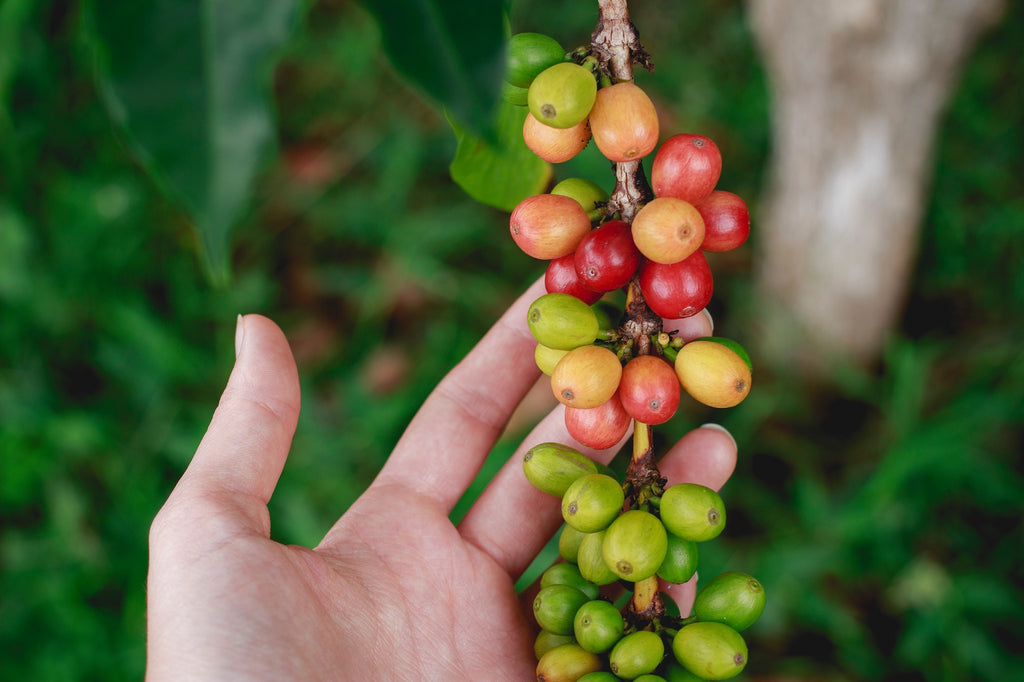Coffee Waste: Cascara
As consumer awareness grows for the issue of food waste, so coffee producers are looking to curb waste in the industry using the flavor benefits of cascara, a natural bi-product of the coffee production process.
What Is Cascara?
Cascara, which translates as "husk" or "peel" in Spanish, refers to the outer husk of the coffee cherry that wraps around coffee beans. Since it's essentially the "fruit" of the coffee tree, it's also a valuable source of fiber and antioxidants.
Typically these husks are discarded in coffee production but can be used just like tea leaves: dried, then steeped and brewed as a beverage. They impart a subtle, sweet flavor with overtones of berries and maple syrup. The beverage can either be enjoyed on its own or brewed latte style.
To brew a pour over style cascara, use a ratio of 5 grams (0.18 oz) of dry cascara for every 100 ml (3.4 fl oz) of water that's been heated to 93°C/200F. Let the cascara steep for approximately 4 minutes to infuse before drinking.
Like tea and coffee, cascara is a caffeinated product. However cascara only contains around 25% as much caffeine as coffee beans. Steeping time doesn't affect the quantity of caffeine in the end brew, instead this is tied to the quantity of husks used.
Origins
It's thought people started drinking cascara before they discovered the beans could be roasted to make coffee!
This beverage has been traditionally consumed in Bolivia as a beverage called "sultana" and parts of Yemen as "qishr," a drink containing spices and coffee husks.
Why Coffee Production Creates Food Waste

Coffee husks, which can be fermented or dried depending on climatic conditions, are separated from the beans then typically discarded during the coffee production process.
This accounts for a large quantity of food waste, with around 40% of the coffee pulp and husk thrown away.
While fermented cascara (unfermented is too acidic for the soil) can be an effective fertilizer, in practice 97% of the discarded pulp goes to landfill. There it decomposes through the action of microbes fermenting the waste, a process which releases greenhouse gas methane. This has is 25 times more effective at trapping heat in the atmosphere than carbon dioxide, which leads to climate change.
Cascara's Economic Potential

Aside from preventing an important source of food waste, the cascara trade could also improve the economics of the coffee trade.
Increasing demand for cascara would make coffee a more profitable crop for farming communities (selling cascara doubles a coffee farmer's income), especially for small or independent farms at a disadvantage from global pricing dynamics.
With 25 million families' livelihoods tied to coffee production around the world, this trade could have an especially beneficial impact on developing nations, 50% of whose export economies depend on commodity crops like coffee.
Chemicals and Cascara
Coffee plants are naturally prone to disease. As a result, many commercial coffee farms treat their plants with pesticides (including chemicals banned in the United States and Europe), which first find their way into the husk. Similarly chemicals may be used during coffee processing to remove caffeine or strip beans of any residual mucilage.

While evidence shows pesticides can be harmful to wildlife, only limited research exists about what this means for humans.
Equally few studies have been conducted to explore how quantities of these pesticides and chemicals vary across each part of the coffee cherry.
This area is an especially important consideration for cascara drinkers since, while some chemicals may be lost during the coffee bean roast step, cascara is usually only dried before consumption.
As a result those concerned about residual chemicals may prefer to use cascara from certified organic coffee growers who don't use chemicals.
Buying organic cascara also provides a boost for smallhold farmers who struggle with the economics of organic certification despite practicing these farming methods.
The Future of Coffee?

While cascara is still a relative newcomer to the coffee scene, interest and awareness for its benefits have been growing.
Last year, global coffee chain Starbucks trialed a cascara latte in their stores in the United States. At the same time, many craft coffee and tea companies have started to carry cascara to complement to their regular offerings.
Meanwhile a new batch of startups, including Nomad and Lazy Bear Tea, are using cascara as the basis for new cold brew and iced tea style drinks.
Finally the team at eatCultured have also explored how their unique fermentation science can enhance this fruity beverage.
Ultimately, curbing coffee waste and the potential to thereby improve the livelihoods of many millions of coffee farmers is tied to consumer demand.
---




Leave a comment
Please note, comments must be approved before they are published